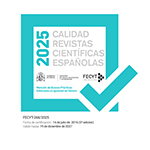The Falange is a way of being (a woman): gender discourses and identities in the Women Section’s periodicals (1938-1945)
Abstract
The Women Section of the Falange’s periodicals in the forties, Medina and Y, contributed to the construction and dissemination of ideals for womanhood accepted in the early period of Franco Dictatorship. Contrary to the thesis that the domesticity model, by virtue of which women were exclusively conceived as spouses and mothers, was reinforced and it emerged as the only referent for Spanish women in the postwar, the analysis of these periodicals confirms that the construction of gender models was a process permeated by tensions and contradictions. These were the legacy of social and cultural changes that had taken place in previous decades, as well as the experience of the Spanish Civil War that, by means of the active participation of thousands of women in the war effort, the dominant gender models in the Francoist side became redefined. Besides, altered these female publications reflected the fascist women’s efforts to negotiate their place in Franco Dictatorship, as well as their desire to make visible their contribution to the ‘New Spain’. To sum up, the article explores the construction of femininity in the Spanish postwar as a process defined by the instability instead of the imposition of a rigid and immutable model.Downloads
Article download
License
Aquellos autores/as que tengan publicaciones con esta revista, aceptan los términos siguientes:
a. Los autores/as conservarán sus derechos de autor y garantizarán a la revista el derecho de primera publicación de su obra, el cuál estará simultáneamente sujeto a la Licencia de reconocimiento de Creative Commons Reconocimiento-No comercial-Sin obra derivada 4.0 España que permite a terceros compartir la obra siempre que se indique su autor y su primera publicación esta revista.
b. Los autores/as podrán adoptar otros acuerdos de licencia no exclusiva de distribución de la versión de la obra publicada (p. ej.: depositarla en un archivo telemático institucional o publicarla en un volumen monográfico) siempre que se indique la publicación inicial en esta revista.
Plagio y fraude científico
La publicación de un trabajo que atente contra los derechos de propiedad intelectual será responsabilidad de los autores/as, que serán los que asuman los conflictos que pudieran tener lugar por razones de derechos de autor. Los conflictos más importantes pueden darse por la comisión de plagios y fraudes científicos.
Se entiende por plagio:
1.Presentar el trabajo ajeno como propio.
2.Adoptar palabras o ideas de otros autores sin el debido reconocimiento.
3.No emplear las comillas u otro formato distintivo en una cita literal.
4.Dar información incorrecta sobre la verdadera fuente de una cita.
5.El parafraseo de una fuente sin mencionar la fuente.
6.El parafraseo abusivo, incluso si se menciona la fuente.
Las prácticas constitutivas de fraude científico son las siguientes:
1.Fabricación, falsificación u omisión de datos y plagio.
2.Publicación duplicada.
3.Conflictos de autoría.












